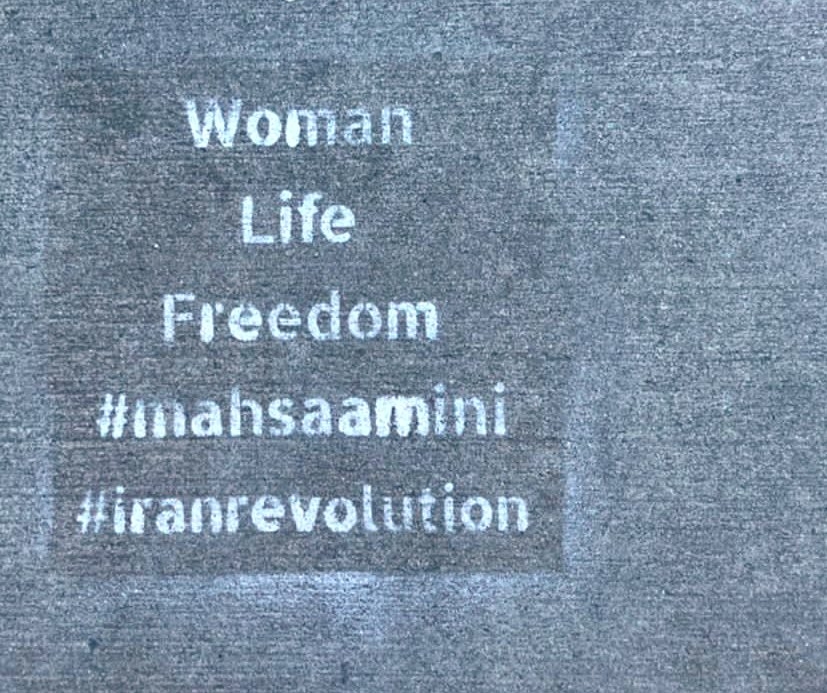How will a democratic revolution in Iran affect the region and world security?
Iran is the stage for a new wave of protests and demonstrations after the brutal crackdown of the 2018 and 2019 protests. The current protests have gone beyond the previous waves of demonstrations and transformed into a revolutionary movement engaging more than 100 cities around Iran. Iranian Z generation is at the frontline of the protests, while women are at the core of this movement, physically and theoretically.
For the first time since the 1979 revolution, people have been holding demonstrations and protests in the streets for almost three weeks. They chant death to the dictator and “Women, Life, Liberty” from the windows and roofs of their home, and a sweeping wave of artists, sportsmen, and women are announcing their support for the movement. The slogan “Women, Life, Liberty” summarizes the demands and visions of the revolutionary generation in Iran, fighting for the dignity and fundamental rights of women, human rights observation, a decent life for everyone, and freedom in all aspects of their lives.
Looking back at the forty-three-year life of the Islamic Republic of Iran, we see that almost all western and democratic states have failed to support the popular movements and uprisings in Iran, and those very few that announced their support did not go beyond vague and general announcements and condemnations.

Now that the popular movement in Iran is gathering momentum every day and spreading over more cities and sections of society, many Iranians believe that democratic states, especially those in the EU and USA, must support this movement for the sake of democracy. But I think those western governments must support this movement in its struggle to create radical changes in Iran, not just for the sake of democracy and to be responsible as the free world’s leaders, but for their security, national interests, and objectives in the region and world.
Suppose the radical changes this movement is fighting for are made in Iran, along with the domestic democratic institutions and policies. In that case, considerable shifts in the situation of the middle-east and the world will ensue. Considering that the western states favor a peaceful middle-east, with independent national governments in power and no more headaches from proxy organizations, they must not only support any movement that might bring such change but also do anything to help it succeed.
If there is no intervention in the political life of Iraq, with the financial, logistic, and ideological support to the Shiite militia organizations stopped, Iraqis will have the chance to have a national and democratically elected government in power after a long time. The interventions and meddling of the Islamic Republic in Iraq`s politics have gone so far that even those Shiite parties who used to stand with them are calling for their expulsion from Iraq. The Islamic Republic does not allow a democratic and national government in Iraq that represents all factions and parties and acts according to their national interest.
There is no prospect of sustainable peace in Yemen as long as the Houthis have Islamic Republic`s support. Without the financial and military support from Tehran, Houthis cannot be able to prolong the civil war in Yemen. Without these foreign interventions, Yemenis can come together, sit at a table, and negotiate their differences to reach a sustainable peace. When there is no puppeteer to use Houthi factions and groups as a proxy to destabilize the region, the peace prospect can be seen more clearly.
Since the birth of IR, it has supported Palestinian and Lebanese armed and political groups to force western states into more concessions. IR`s allied groups in this part of the Middle East reject any negotiations and denounce any ideas of peaceful coexistence. Imagine no government in Iran pours arms into the region, supports militia organizations, pumps money into the terrorist groups of Hezbollah and Hamas to buy their allegiance and use them for annihilating any chances of peace agreements. Settling the border disagreements between Lebanon and Israel, forming a national government in Lebanon, and creating a mighty army as the only armed organization in this country, a sustainable peace agreement between Israelis and Palestinians to exist in peace next to each other will not be an out-of-reach dream.
The Middle East’s political stage will change drastically with a reasonable, law-abiding government in Iran. Iran’s oil and gas will enter the market, the oil that has been sanctioned and removed from the market for a long time, affecting oil prices and oil-producing countries` grip over industrial countries, depriving Russia of leverage it has used against Europe for a long time. Considering Iran’s important role in Russia and China`s policies confronting the EU and the USA, replacing that regime with a democratic government that only has its national interest in mind can be a game-changer in this long-time international competition.
Iranians are tired of the frustrating nuclear crisis, unending negotiations, crippling sanctions, and unimaginable costs the nation has paid for the nuclear ambitions of the IR. This international threat of a terror-sponsor state with atomic capabilities and the ongoing cat-and-mouse game will be finished. The case will be closed forever if this system is overthrown and a national democratic government comes to power.
Putting aside democratic and humanitarian values and focusing only on their political interest and security issues, Western states must welcome the national revolutionary movements in Iran and support them beyond announcements and press conferences, because such a democratic revolution in Iran would create substantial changes in the region, national security of middle-east countries, the UE and north American states.

The word is not mentioned in this essay but could religion not play a useful part in bringing about meaningful change?